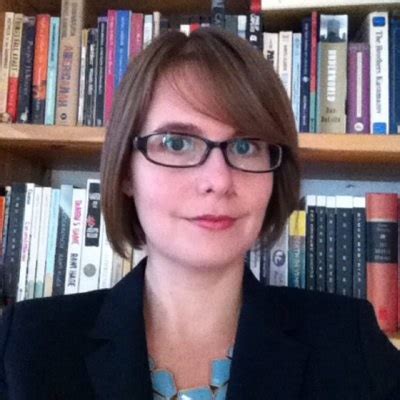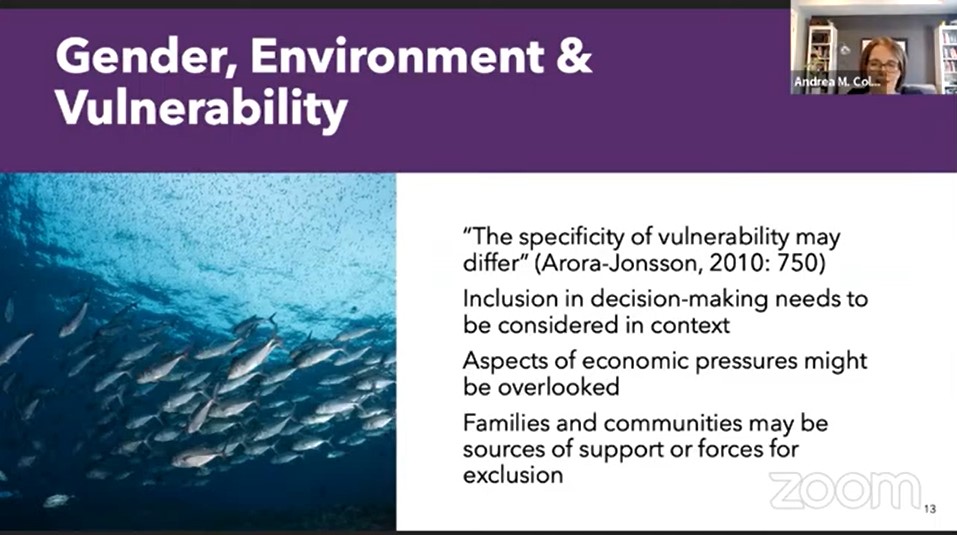This talk by Andrea M. Collins of the University of Waterloo in Canada provided a high-level overview of the various tools and perspectives for undertaking gender-focused analysis in resource sectors such as small-scale fisheries. Drawing from gender studies, feminist political ecology, feminist political economy, and political science, this talk dispelled the idea that gender analysis means only focusing on women. It showed how understanding the many dimensions of gender roles and relations can improve the analysis of resource management and economic activity, expand our understanding of vulnerability and empowerment, and advance policy-relevant outcomes.

Andrea was careful to make it clear to the audience that gender is best understood as a relationship of a person to one or more others. Gender should be understood as a social structure that shapes for example economic spaces and activity, political spaces and activity and familial and community spaces and the relations between people in these spaces. In other words, gender represents a person’s identity, but it also refers to the social role of a person and goes beyond sex.
Other conditions that affect what behaviour or roles people are expected to play in their society may be marked by religion, caste, refugee status, wealth or other dimensions. In other words, context matters a lot as to how gender molds a person’s vulnerability or power.
The gender role of women does not automatically mean that they are always vulnerable and weak. Rather, asking questions beyond the widespread stereotypes will help getting a more realistic impression and understanding of gender relations in family, community and wider society: who has access to economic and other resources and can, for example, effectively take part in social, economic and legal decision making. Such improved understanding has great potential in better decision making and more adequate policies to frame conditions within which people operate.
Click here for the full webinar presentation and Q&A session.

Small-Scale Fisheries Academy
- Make Fishing Fair in the EU, 25 March 2025
- Human – Biodiversity Relationships Across Scales
- World Fisheries Day, 21 November 2024, celebrated in Nigeria
- Mundus maris participated in the 2024 World Fisheries Day organized by Canoe and Fishing Gear Association of Ghana (CaFGOAG).
- Mundus maris contribution to the UNOC3 public consultation
- Small-Scale Fisheries Summit in Rome, 5-7 July 2024
- Regional Symposium on European Small-Scale Fisheries, Larnaca, Cyprus, 1-3 July 2024
- Baltic Fisheries Emergency Meeting, Brussels, 26 June 2024
- Ambivalent role of Market and Technology in the Transitions from Vulnerability to Viability: Nexus in Senegal SSF
- Shell fisheries as stewardship for mangroves
- African edition of 4WSFC in Cape Town, 21 to 23 November 2022
- World Fisheries Day, 21 November 2023
- Webinar: Nigeria’s Fisheries challenges and opportunities
- Presenting the FishBase app at the Symposium in Tervuren
- MARE Conference on Blue Fear – Mundus maris reflects
- The Transition From Vulnerability to Viability Through Illuminating Hidden Harvests, 26 May 2023
- EGU sessions focused on geoethics and joint learning, 23-28 April 2023
- Solidarity with artisanal fishers in Senegal and Mauritania
- The legal instruments for the development of sustainable small-scale fisheries governance in Nigeria, 31 March 2023
- Tools for Gender Analysis: Understanding Vulnerability and Empowerment, 17 February 2023
- Community resilience: A framework for non-traditional field research, 27 January 2023
- Sustainability at scale – V2V November webinar
- European edition of 4WSFC in Malta, 12-14 September 2022
- Mundus maris contributes to SSF Summit in Rome
- Women fish traders in Yoff and Hann, Senegal, victims or shapers of their destiny?
- The Academy continues its work in Yoff
- Illuminating the Hidden Harvest – a snapshot
- Virtual launch event FAO: International Year of Artisanal Fisheries and Aquaculture
- The Small-Scale Fisheries Academy as a source of operational support to PA Guidelines
- World Fisheries Congress, Adelaide, 20-24 September
- Mundus maris supports the fight of Paolo, the fisher, in Tuscany, Italy
- Catching-up – SSF Academy Yoff, 27 Febr. 2021
- Strengthening capacities of the actors for sustainable small-scale fisheries
- Testing training methods during the pilot phase of the SSF Academy in Senegal
- A premiere – launch of a Small-Scale Fisheries Academy in Senegal
